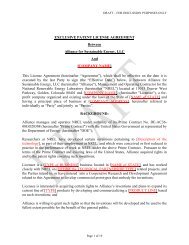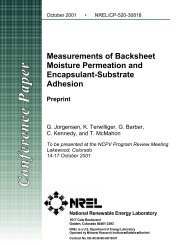Steam Digest 2002 - CiteSeerX
Steam Digest 2002 - CiteSeerX
Steam Digest 2002 - CiteSeerX
You also want an ePaper? Increase the reach of your titles
YUMPU automatically turns print PDFs into web optimized ePapers that Google loves.
Preliminary Results from the Industrial <strong>Steam</strong> Market Assessment<br />
48<br />
Table 4: Pulp and Paper Thermal Energy Requirements by Product Type<br />
Paper<br />
Products<br />
Paper<br />
Board<br />
Energy<br />
C<br />
onsumption<br />
by<br />
roduct<br />
pulp and paper industry was 1,980 trillion Btu.<br />
Applying a 75 percent conversion factor results in<br />
an estimated boiler fuel use of 2,640 (= 1,980/<br />
0.75) trillion Btu.<br />
MECS indicates that the fuel used to generate<br />
steam in the pulp and paper industry was 2,221<br />
trillion Btu (refer to Table 1), which is about 16<br />
percent less than the 2,640 trillion Btu estimate.<br />
Although many assumptions are built into this<br />
model, the relative agreement between these data<br />
indicates that these assumptions are reasonable.<br />
Petroleum Refining Industry <strong>Steam</strong> Use<br />
The petroleum refining industry uses energy to<br />
convert crude oil into many different products,<br />
some of which are used directly by consumers,<br />
while others are feedstocks for other industries.<br />
Petroleum refining uses a series of processes to produce<br />
these products. Combining the energy required<br />
by each process and the amount of product<br />
that was produced by each process provides<br />
an estimate of the total amount of energy used by<br />
the industry. Additionally, the component energy<br />
types, including direct-fired, electric, and<br />
steam, can be disaggregated from the energy data<br />
for each refining process [2]. This allocation al-<br />
P<br />
<strong>Steam</strong> <strong>Digest</strong> <strong>2002</strong><br />
ProductionThermalEnergyConsumption ( Thousand<br />
short<br />
tons)<br />
( Trillion<br />
Btus)<br />
ProductMin Max Ave<br />
Newsprint6, 984<br />
54 173 113<br />
Groundwoodprinting&converting1, 915<br />
15 47 31<br />
Coatedpaper8, 804<br />
141 291 216<br />
Uncoatedfreesheets13, 304<br />
213 439 326<br />
Bleachedbristols1, 383<br />
22 46 34<br />
Cottonfiber159 3 5 4<br />
Thinpapers149 2 5 4<br />
Tissue6, 098<br />
98 201 149<br />
Unbleachedkraft2, 308<br />
30 69 50<br />
Bleached, specialty<br />
packaging<br />
2, 417<br />
39 80 59<br />
Unbleachedkraftpaperboard22, 468<br />
292 674 483<br />
Solidbleachedpaperboard5, 029<br />
80 166 123<br />
Semichemicalpaperboard5, 943<br />
101 208 155<br />
Recycledpaperboard12, 283<br />
123 332 227<br />
Total1, 212<br />
2, 735<br />
1,<br />
974<br />
lows the total steam use within the industry to<br />
be evaluated against the amount of fuel used to<br />
generate steam as indicated by MECS.<br />
Table 5 describes the average energy requirements<br />
of the key refining processes by technology and<br />
combines production estimates to calculate overall<br />
industry energy use [5,6]. The total steam energy<br />
use is estimated to be 1,071 trillion Btu. If<br />
the steam system efficiency is 75 percent, then the<br />
fuel use that corresponds to this energy estimate<br />
is 1,428 trillion Btu.<br />
To evaluate the accuracy of the “energy use by process”<br />
approach, recall that the MECS estimate for<br />
the amount of fuel used to generate steam in the<br />
petroleum refining industry was 1,676 trillion Btu.<br />
The resulting difference is 248 trillion Btu or about<br />
15 percent. In relative terms the “energy use by<br />
process” approach indicates that steam represents<br />
46 percent (= 1,071/2,333) of the total energy use,<br />
while MECS indicates that the fuel used to generate<br />
steam represents about 53 percent of the industry<br />
fuel use.
















